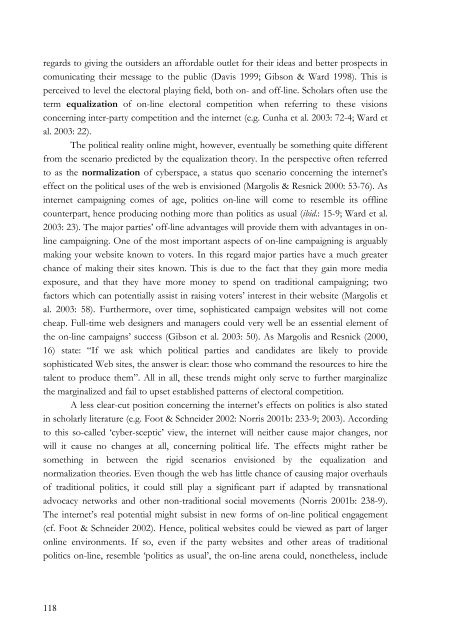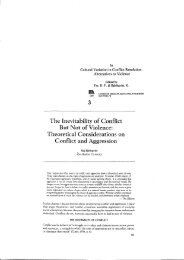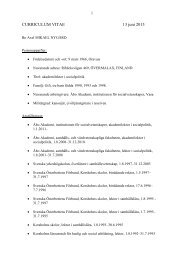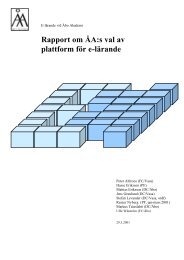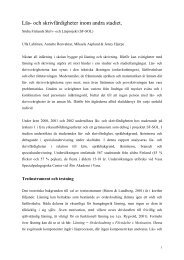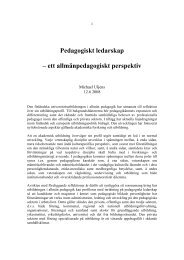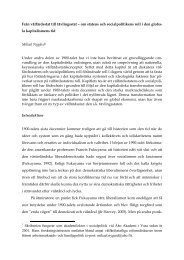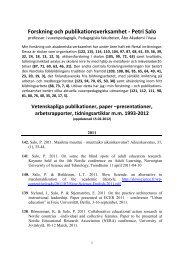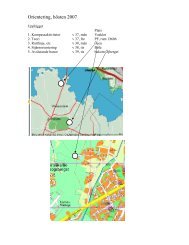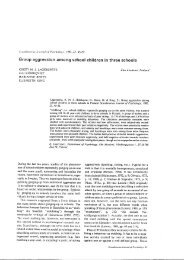Parties, Candidates and Citizens On-Line - Åbo Akademi
Parties, Candidates and Citizens On-Line - Åbo Akademi
Parties, Candidates and Citizens On-Line - Åbo Akademi
Create successful ePaper yourself
Turn your PDF publications into a flip-book with our unique Google optimized e-Paper software.
egards to giving the outsiders an affordable outlet for their ideas <strong>and</strong> better prospects in<br />
comunicating their message to the public (Davis 1999; Gibson & Ward 1998). This is<br />
perceived to level the electoral playing field, both on- <strong>and</strong> off-line. Scholars often use the<br />
term equalization of on-line electoral competition when referring to these visions<br />
concerning inter-party competition <strong>and</strong> the internet (e.g. Cunha et al. 2003: 72-4; Ward et<br />
al. 2003: 22).<br />
The political reality online might, however, eventually be something quite different<br />
from the scenario predicted by the equalization theory. In the perspective often referred<br />
to as the normalization of cyberspace, a status quo scenario concerning the internet’s<br />
effect on the political uses of the web is envisioned (Margolis & Resnick 2000: 53-76). As<br />
internet campaigning comes of age, politics on-line will come to resemble its offline<br />
counterpart, hence producing nothing more than politics as usual (ibid.: 15-9; Ward et al.<br />
2003: 23). The major parties’ off-line advantages will provide them with advantages in online<br />
campaigning. <strong>On</strong>e of the most important aspects of on-line campaigning is arguably<br />
making your website known to voters. In this regard major parties have a much greater<br />
chance of making their sites known. This is due to the fact that they gain more media<br />
exposure, <strong>and</strong> that they have more money to spend on traditional campaigning; two<br />
factors which can potentially assist in raising voters’ interest in their website (Margolis et<br />
al. 2003: 58). Furthermore, over time, sophisticated campaign websites will not come<br />
cheap. Full-time web designers <strong>and</strong> managers could very well be an essential element of<br />
the on-line campaigns’ success (Gibson et al. 2003: 50). As Margolis <strong>and</strong> Resnick (2000,<br />
16) state: “If we ask which political parties <strong>and</strong> c<strong>and</strong>idates are likely to provide<br />
sophisticated Web sites, the answer is clear: those who comm<strong>and</strong> the resources to hire the<br />
talent to produce them”. All in all, these trends might only serve to further marginalize<br />
the marginalized <strong>and</strong> fail to upset established patterns of electoral competition.<br />
A less clear-cut position concerning the internet’s effects on politics is also stated<br />
in scholarly literature (e.g. Foot & Schneider 2002: Norris 2001b: 233-9; 2003). According<br />
to this so-called ‘cyber-sceptic’ view, the internet will neither cause major changes, nor<br />
will it cause no changes at all, concerning political life. The effects might rather be<br />
something in between the rigid scenarios envisioned by the equalization <strong>and</strong><br />
normalization theories. Even though the web has little chance of causing major overhauls<br />
of traditional politics, it could still play a significant part if adapted by transnational<br />
advocacy networks <strong>and</strong> other non-traditional social movements (Norris 2001b: 238-9).<br />
The internet’s real potential might subsist in new forms of on-line political engagement<br />
(cf. Foot & Schneider 2002). Hence, political websites could be viewed as part of larger<br />
online environments. If so, even if the party websites <strong>and</strong> other areas of traditional<br />
politics on-line, resemble ‘politics as usual’, the on-line arena could, nonetheless, include<br />
118


